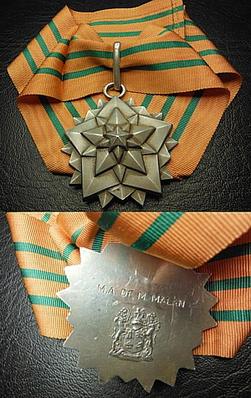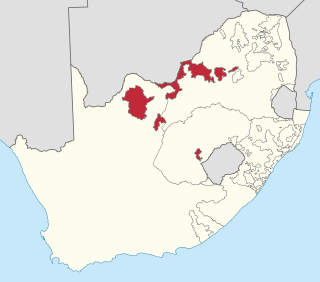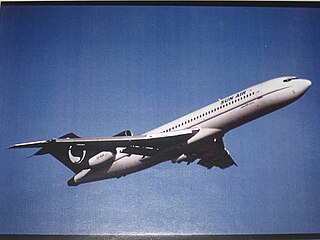
Bophuthatswana, officially the Republic of Bophuthatswana, was a Bantustan that was declared (nominally) independent by the apartheid regime of South Africa in 1977. However, its independence, like the other Bantustans was not recognized by any country other than South Africa.

A Bantustan was a territory that the National Party administration of South Africa set aside for black inhabitants of South Africa and South West Africa, as part of its policy of apartheid. By extension, outside South Africa the term refers to regions that lack any real legitimacy, consisting often of several unconnected enclaves, or which have emerged from national or international gerrymandering.
Kgosi Lucas Manyane Mangope was the leader of the Bantustan (homeland) of Bophuthatswana. The territory he ruled over was distributed between the Orange Free State – what is now Free State – and North West Province. He was also the founder and leader of the United Christian Democratic Party, a political party based in the North West of South Africa.

North West is a province of South Africa. Its capital is Mahikeng. The province is located to the west of the major population centre of Gauteng and south of Botswana.
Bophuthatswana was an independent Bantustan between 1977 and 1994. There were only two coins struck. Both of them were issued in proof coinage only. Bophuthatswana was the only Bantustan to have had their own coins, but the official currency was the South African rand.

The Star of South Africa, post-nominal letters SSA, is a military decoration for merit which was instituted by the Union of South Africa from 1952 to 1975. It was awarded to general and flag officers of the South African Defence Force for exceptionally meritorious service. The Star of South Africa was discontinued on 1 July 1975, when a new set of orders, decorations and medals was instituted.

The 1994 Bophuthatswana crisis was a major political crisis which began after Lucas Mangope, the president of Bophuthatswana, a South African bantustan created under apartheid, attempted to crush widespread labour unrest and popular demonstrations demanding the incorporation of the territory into South Africa pending non-racial elections later that year. Violent protests immediately broke out following President Mangope's announcement on 7 March that Bophuthatswana would boycott the South African general elections. These escalated into a civil service strike and a mutiny in the local armed forces, which was complicated by the arrival of right-wing Afrikaner extremists ostensibly seeking to preserve the Mangope government. The chaos lasted about four days before the president bowed to pressure and agreed to allow participation in the upcoming elections. However, Mangope once again reversed his decision. The South African Defence Force (SADF) responded by deposing him and restoring order on 12 March.
Postal orders were issued in South Africa from 31 May 1910. South Africa issued both its own postal orders and British postal orders.
The North West Division of the High Court of South Africa is a superior court of law with general jurisdiction over the western part of North West province of South Africa. The division sits at Mahikeng.

This is a survey of the postage stamps and postal history of South Africa.

The first South African military medal was a campaign medal, the South Africa Medal, instituted in 1854 by Queen Victoria, the sovereign of the United Kingdom of Great Britain and Ireland, for award to officers and men of the Royal Navy and British Army who served on the Eastern Frontier of the Cape Colony between 1834 and 1853 during the Xhosa Wars.

The Independence Medal was instituted by the State President of the Republic of Bophuthatswana to commemorate that country's independence on 6 December 1977. It was awarded to all ranks on the active strength of the Bophuthatswana Defence Force upon independence.

The Defence Force Merit Decoration was instituted by the State President of the Republic of Bophuthatswana in 1982, for award to officers for distinguished service of high quality and utmost devotion to duty.
The State President's Medal for Shooting was instituted by the State President of the Republic of Bophuthatswana in 1990, for award to champion shots.

The Bophuthatswana Defence Force was established on 6 December 1977 from trainees of the South African Defence Force. It was the defence force of the Republic of Bophuthatswana, a nominally independent bantustan during the Apartheid era of South Africa.

Sun Air was a South African airline, originally owned by the Bantustan of Bophuthatswana, and later privatised. It ceased operations in 1999.

The 1987 Transkei coup d'état was a bloodless military coup in Transkei, an unrecognised state and a nominally independent South African homeland for the Xhosa people, which took place on 30 December 1987. The coup was led by the then 32-year-old Major General Bantu Holomisa, the Chief of the Transkei Defence Force, against the government of Prime Minister Stella Sigcau (TNIP). Holomisa suspended the civilian constitution and refused South Africa's repeated demands for a return to civilian rule on the grounds that a civilian government would be a puppet controlled by Pretoria.

The 1990 Ciskei coup d'état was a bloodless military coup in Ciskei, an unrecognised state and a nominally independent South African homeland for the Xhosa people, which took place on 4 March 1990. The coup was led by the then 37-year-old Brigadier Oupa Gqozo, the Chief of Staff Intelligence of the Ciskei Defence Force, against the government of President for Life Lennox Sebe (CNIP), who was on a state visit to Hong Kong at the time. The coup was followed by widespread rioting and looting, prompting Gqozo to request that the South African government send SADF troops to help restore order.

The 1990 Venda coup d'état was a bloodless military coup in Venda, an unrecognised state and a nominally independent South African homeland for the Venda people, which took place on 5 April 1990. The coup was led by the then 48-year-old Colonel Gabriel Ramushwana, the Chief of Staff of the Venda Defence Force, against the government of President Frank Ravele (NPV).













